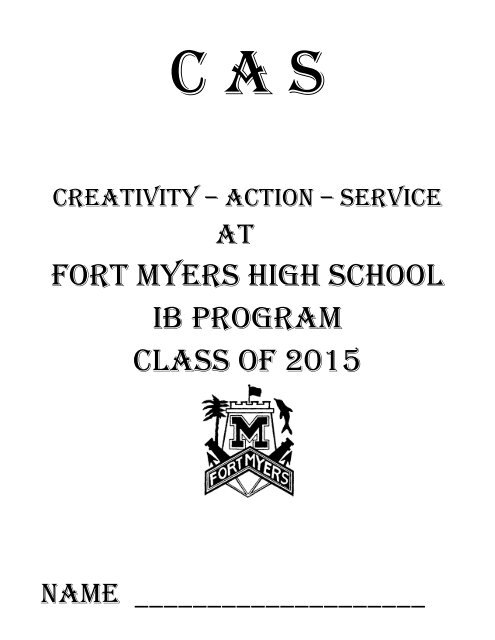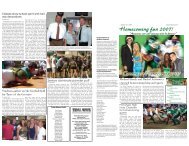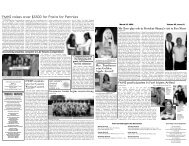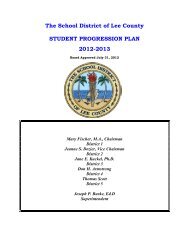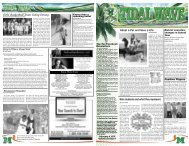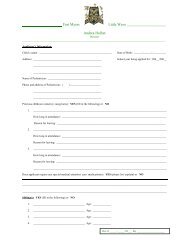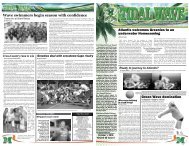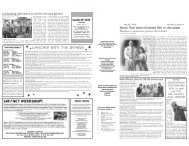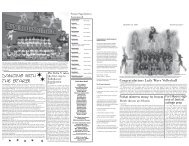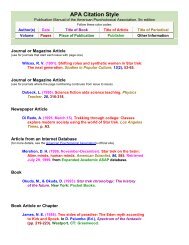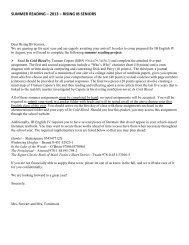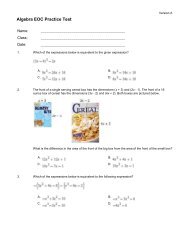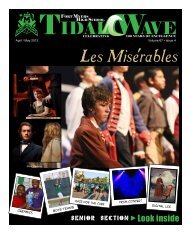WHAT IS CAS - Fort Myers High School
WHAT IS CAS - Fort Myers High School
WHAT IS CAS - Fort Myers High School
Create successful ePaper yourself
Turn your PDF publications into a flip-book with our unique Google optimized e-Paper software.
C A S<br />
CREATIVITY – ACTION – SERVICE<br />
AT<br />
FORT MYERS HIGH SCHOOL<br />
IB PROGRAM<br />
CLASS OF 2015<br />
NAME ____________________
The nature of creativity, action, service<br />
...if you believe in something, you must not just think or talk or write, but must act.<br />
Peterson (2003)<br />
<strong>WHAT</strong> <strong>IS</strong> <strong>CAS</strong>?<br />
Creativity, action, service (<strong>CAS</strong>) is at the heart of the Diploma Programme. It is one of<br />
the three essential elements in every student’s Diploma Programme experience. It involves<br />
students in a range of activities alongside their academic studies throughout the Diploma<br />
Programme. The three strands of <strong>CAS</strong>, which are often interwoven with particular<br />
activities, are characterized as follows:<br />
Creativity: arts, and other experiences that involve creative thinking.<br />
Action: physical exertion contributing to a healthy lifestyle, complementing<br />
academic work elsewhere in the Diploma Programme.<br />
Service: an unpaid and voluntary exchange that has a learning benefit for the<br />
student. The rights, dignity and autonomy of all those involved are respected.<br />
<strong>CAS</strong> enables students to enhance their personal and interpersonal development through<br />
Experiential Learning. At the same time, it provides an important counterbalance to the<br />
academic pressures of the rest of the Diploma Programme. A good <strong>CAS</strong> programme should<br />
be both challenging and enjoyable, a personal journey of self-discovery. Each individual<br />
student has a different starting point, and therefore different goals and needs, but for<br />
many their <strong>CAS</strong> activities include experiences that are profound and life changing.<br />
For student development to occur, <strong>CAS</strong> should involve:<br />
• real, purposeful activities, with significant outcomes<br />
• personal challenge-tasks must extend the student and be achievable in scope<br />
• thoughtful consideration, such as planning, reviewing progress, reporting<br />
• reflection on outcomes and personal learning<br />
All proposed <strong>CAS</strong> activities need to meet these four criteria. It is also essential that they<br />
do not replicate other parts of the student’s Diploma Programme work.<br />
Concurrency of learning is important in the Diploma Programme. Therefore, <strong>CAS</strong> activities<br />
should continue on a regular basis for as long as possible throughout the programme, and<br />
certainly for at least 18 months.<br />
Successful completion of <strong>CAS</strong> is a requirement for the award of the IB diploma. Students<br />
need to document their activities and provide evidence that they have achieved eight key<br />
learning outcomes.
Experiential learning is the process whereby knowledge is created<br />
through the transformation of experience.<br />
David A. Kolb (1984)<br />
The benefits of experiential learning are that students are enabled to:<br />
• See the application of academic learning, social and personal skills to<br />
real-life situations<br />
• Bring real benefits to self and/or others<br />
• Understand their own capacity to make a difference<br />
• Make decisions that have real, not hypothetical, results<br />
• Develop skills to solve problems<br />
• Develop a sense of responsibility and accountability for their actions<br />
PLAN – ACT – OBSERVE - REFLECT<br />
PLAN<br />
Identify goals – use the SMART goal technique:<br />
S: Specific (Name it and claim it!)<br />
M: Measureable (What are the benchmarks?)<br />
A: Attainable (How will this occur?)<br />
R: Realistic (Is this reasonable?)<br />
T: Time bound (What is the deadline?)<br />
ACT (Do)<br />
Real tasks, concrete experience: Does it have real consequences for other<br />
people and for me?<br />
OBSERVE<br />
Think about feelings and interactions.<br />
How does this change your perception?<br />
REFLECT<br />
The fundamentals are simple. Of any activity, it is appropriate to ask the<br />
following questions:<br />
• What did I plan to do?<br />
• What did I do?<br />
• What were the outcomes, for me, the team I was working with, and<br />
others?<br />
Identify achievements and outstanding issues, personal strengths and<br />
challenges.<br />
Express the results of your actions.<br />
Express how your participation gave you a new understanding.<br />
How can I apply what I have learned in new situations?
The main focus of <strong>CAS</strong> is achieving the eight Learning Outcomes. This focus on<br />
Learning Outcomes emphasizes that it is the quality of a <strong>CAS</strong> activity (its contribution<br />
to the student’s development) that is of most importance. By involving the student in<br />
150 hours of <strong>CAS</strong> activities, students should have ample opportunity to achieve these<br />
Learning Outcomes.<br />
LEARNING OUTCOMES<br />
__________________________________________________<br />
As a result of their <strong>CAS</strong> experience as a whole, including their reflections, there should be<br />
evidence that students have:<br />
increased their awareness of their own strengths and areas for growth<br />
They are able to see themselves as individuals with various skills and abilities, some<br />
more developed than others, and understand that they can make choices about how<br />
they wish to move forward.<br />
undertaken new challenges<br />
A new challenge may be an unfamiliar activity, or an extension to an existing one<br />
planned and initiated activities<br />
Planning and initiation will often be in collaboration with others. It can be shown in<br />
activities that are part of larger projects, for example, ongoing school activities in<br />
the local community, as well as in small student-led activities.<br />
worked collaboratively with others<br />
Collaboration can be shown in many different activities, such as team sports, playing<br />
music in a band, or helping in kindergarten. At least one project involving<br />
collaboration and the integration of at least two of creativity, action and service,<br />
and of significant duration (typically 25 or more hours) is required.<br />
Shown perseverance and commitment in their activities<br />
At a minimum, this implies attending regularly and accepting a share of the<br />
responsibility for dealing with problems that arise in the course of activities.<br />
Engage with issues of global importance<br />
Students may be involved in international projects but there are many global issues<br />
that can be acted upon locally or nationally (for example, environmental concerns)<br />
Considered the ethical implications of their actions<br />
Ethical decisions arise in almost any <strong>CAS</strong> activity (for example, on the sports field,<br />
in musical composition, in relationships with others involved in service activities).<br />
Evidence of thinking about ethical issues can be shown in various ways, including<br />
journal entries and conversations with <strong>CAS</strong> advisers.<br />
Developed new skills<br />
As with new challenges, new skills may be shown in activities that the student has<br />
not previously undertaken, or in increased expertise in an established area.<br />
All eight outcomes must be present for a student to complete the <strong>CAS</strong><br />
requirement. Some may be demonstrated many times, in a variety of activities, but<br />
completion requires only that there is some evidence for every outcome.
AIMS<br />
The <strong>CAS</strong> program aims to develop students who are:<br />
reflective thinkers – they understand their own strengths and limitations,<br />
identify goals and devise strategies for personal growth<br />
willing to accept new challenges and new roles<br />
aware of themselves as members of communities with responsibilities towards<br />
each other and the environment<br />
active participants in sustained, collaborative projects<br />
balanced – they enjoy and find significance in a range of activities involving<br />
intellectual, physical, creative and emotional experience<br />
RESPONSIBILITIES OF THE STUDENT<br />
Students are required to:<br />
self-review at the beginning of their <strong>CAS</strong> experience and set personal goals for<br />
what they hope to achieve through their <strong>CAS</strong> program<br />
plan, act, observe and reflect (plan activities/identify goals, act/real tasks,<br />
carry them out, observe/think about feelings and interactions, and reflect on<br />
what they have learned)<br />
take part in a range of activities, including at least one project, some of which<br />
they have initiated themselves<br />
maintain online documentation of their activities and Learning Outcomes<br />
show evidence of achievement of the eight <strong>CAS</strong> Learning Outcomes<br />
Students should be involved in <strong>CAS</strong> activities that they have initiated themselves. Other<br />
<strong>CAS</strong> activities may be initiated by the school. Activities should be both challenging and<br />
enjoyable, a personal journey of self-discovery. Therefore, <strong>CAS</strong> activities should continue<br />
on a regular basis for as long as possible throughout the program, but certainly for at least<br />
18 months.
CREATIVITY<br />
This aspect of <strong>CAS</strong> is interpreted as imaginatively as possible to cover a wide range of<br />
arts and other activities outside the normal curriculum which includes creative thinking in<br />
the design and carrying out of projects. This could involve participation in dance, theater,<br />
music and art, for example. Students should be engaged in group activities, and especially<br />
in new roles, whenever possible. Nevertheless, individual commitment to learning an art<br />
form is allowed, such as learning to play the piano or dance lessons, where it respects the<br />
requirements of all <strong>CAS</strong> activities, which are that goals are set and the student reflects<br />
on their progress. Required completed hours for the Creativity component is 50.<br />
“The legs are the wheels of creativity. ” Albert Einstein (1879-1955)<br />
ACTION<br />
This aspect of <strong>CAS</strong> can include participation in expeditions, individual and team sports, and<br />
physical activities outside the normal curriculum; it also includes physical activity involved<br />
in carrying out creative and service projects. Action involves participation in activities<br />
requiring “physical exertion” contributing to a healthy lifestyle, such as school or<br />
community team sports, skiing, cheerleading, mountain climbing, or any charitable activity<br />
participation such as Walk for the Cure. Students should be encouraged towards group<br />
and team activities, and undertaking new roles, but an individual commitment is acceptable<br />
(taking tennis lessons, for example) where the general requirements of <strong>CAS</strong> are met; that<br />
goals are set and that the student reflects on their progress. Both Creativity and Action<br />
can be enhanced by incorporation the service element. Students involved in the arts and<br />
physical activities might consider coaching a youth sports league or working with seniors in<br />
a non-profit residential home. Required completed hours for the Action component is 50.<br />
“Act as if what you do make a difference. It does. ”<br />
William James (1842-1910)<br />
SERVICE<br />
Service projects and activities are often the most transforming element of the Diploma<br />
Programme for the individual student; they have the potential to influence to global<br />
citizen. Service involves interaction, such as the building of links with individuals or groups<br />
in the community. The community may be the school, the local district, or it may exist on<br />
national and international levels (such as undertaking projects of assistance in a developing<br />
country). Service activities should not only involve doing things for others but also doing<br />
things with others and developing a real commitment with them. Service work would<br />
include volunteering at a non-profit hospital, working on a Habitat for Humanity home site,<br />
or working on or starting up a school or community recycling program. Required completed<br />
hours for the Service component is 50.<br />
“The best way to find yourself is to lose yourself in the service of others. ”<br />
Mahatma Gandhi (1869-1948)
<strong>WHAT</strong> <strong>IS</strong> NOT <strong>CAS</strong>?<br />
What is, or what is not, <strong>CAS</strong> is a question coordinators are frequently asked. If <strong>CAS</strong><br />
becomes an “hour counting” exercise rather than an interesting variety of activities that<br />
the student finds intrinsically worthwhile and rewarding, and which is mutually beneficial<br />
to the student and to his or her community, then its purpose is lost. It is important that<br />
the SPIRIT of <strong>CAS</strong> be considered at all times.<br />
Generally, <strong>CAS</strong> is not taking place when the student is in a passive rather than an active<br />
role. There should be interaction, If the student is passive, nothing of real value, either<br />
for the student or for other people, results from what the student is doing and no real<br />
reflection is possible. In such circumstances the student will be able to meet the<br />
programme objectives only to a very limited extent. Examples of activities which at first<br />
sight would appear to be inappropriate would include:<br />
• Any class, activity or project which is already part of the student’s Diploma<br />
Programme course<br />
• An activity for which a student is personally rewarded either financially or with<br />
some other benefit (unless this benefit is passed on in full to a worthy cause)<br />
• All forms of duty within the family<br />
• Religious devotion and any activity which can be interpreted as proselytizing<br />
• An activity where there is no responsible adult on site to evaluate and confirm<br />
student performance (parents and family members may not serve as supervisors)<br />
GUIDING QUESTIONS<br />
The following questions aim to help students determine whether or not an intended<br />
activity qualifies as <strong>CAS</strong>.<br />
• Is the activity a new role for me?<br />
• Is it a real task that I am going to undertake?<br />
• Does it have real consequences for other people and for me?<br />
• What do I hope to achieve from getting involved?<br />
• How can this activity benefit me and other people?<br />
• What can I reflect on during this activity?<br />
<strong>CAS</strong> is a necessary and mandatory component of the IB program. IB, as well as the<br />
colleges and universities that you will be applying to, wants to see well-rounded students<br />
who step outside of the academic arena and stretch into other areas of their school and<br />
community, particularly those places that students would not normally venture, such as<br />
volunteering at a hospital, hospice, soup kitchen and so forth. You CANNOT receive<br />
all 150 hours volunteering with one core group (i.e. your church group,<br />
scouts, theater group) or in one core area (all hours involve music, or<br />
sports, for example). The responsibility for abiding by the above rests entirely with<br />
the student.
The following information will help you as you begin documenting your <strong>CAS</strong> requirement.<br />
Please do not hesitate to call (334-8280 X 308) if you have questions or email<br />
TeresaKS@Lee<strong>School</strong>s.net.<br />
FOLLOW THESE PROCEDURES<br />
1. Submit your proposal first. Prepare and submit a proposal on ManageBac<br />
BEFORE you begin the activity.<br />
2. Upon finishing your activity, complete the <strong>CAS</strong> Questions and/or<br />
Reflections explaining the Learning Outcomes you have achieved.<br />
3. Request the Supervisor’s Review: click Request Supervisor Review.<br />
ManageBac will send the supervisor an email allowing them to complete your activity<br />
review online. Should your supervisor not have an email address, you may print a<br />
<strong>CAS</strong> Completion Form to have signed by your supervisor.<br />
4. You must complete your reflection questions and request the supervisor to review<br />
within two weeks after completing the activity.<br />
*NOTE: Once your activity has been marked Complete, you will not be<br />
able to add additional evidence or update any of the details. Only click<br />
Request Supervisor Review once you have finished documenting your<br />
activity.<br />
<strong>CAS</strong> opportunities are listed under the “Messages” tab at<br />
the top of your worksheet on the ManageBac website.<br />
Remember, although they are appropriate activities, you<br />
MUST submit a proposal if you intend to adopt one as your<br />
activity.
IDEAS FOR <strong>CAS</strong> ACTIVITIES<br />
CREATIVE – Arts and other activities that include the creative genius or designing<br />
service activities.<br />
ACTION – Physical exertion to include participation in an individual or team sport,<br />
physical training, participation in expeditions, or carrying out creative or service activities.<br />
SERVICE – Are for work in the community which may include the school community, the<br />
local community or the global community.<br />
C A S<br />
Music Baseball ACT<br />
Dance Basketball Alliance for the Arts<br />
Photography Club/Competitions Cross Country Big Brothers/Sisters<br />
Drama Cheerleading Children’s Home Society<br />
Language Clubs Hockey Habitat for Humanity<br />
Mock Trial Sailing Hope Hospice<br />
Phi Delta Y Skating Humane Society<br />
Marching Band Softball Imaginarium Museum<br />
Symphony Soccer Calusa Nature Center<br />
Student Leadership Conference Swimming Food Banks<br />
Odyssey of the Mind Track Meals on Wheels<br />
Mu Alpha Theta Tennis Soup Kitchen<br />
Art Club Wrestling Hospital Volunteer<br />
Web Page Design Volleyball Library Volunteer<br />
Planning/Decorating for events Walks for the Cure Teen Court<br />
Multiple Category Activities<br />
Beach Clean Up (A + S)<br />
Camp Counselor (C + A + S)<br />
Canned food drives (A + S)<br />
Meals on Wheels/Soup Kitchen (A + S)<br />
Habitat for Humanity (A + S)<br />
Humane Society (A + S)<br />
Imaginarium (C + A + S)<br />
Calusa Nature Center (C + A + S)<br />
The lists above are not meant to be exhaustive. They are merely to give you ideas<br />
about what works for each area so that you may design your own <strong>CAS</strong> activities.
PROJECTS, THEMES, CONCEPTS<br />
Students MUST be involved in at least one project involving teamwork that integrates two<br />
or more of Creativity, Action and Service, and is of significant duration (typically 25 or<br />
more hours). Larger scale activities of this sort may provide excellent opportunities for<br />
students to engage with “issues of global importance.” From time to time, the IB may<br />
identify broad themes that schools are invited to support. “Sharing Our Humanity” is the<br />
current theme. Such themes may provide a context that will enable students to generalize<br />
further in their reflections, following the maxim “Think globally, act locally. ”<br />
Examples of projects that integrate two or more of Creativity, Action and Service and of<br />
significant duration (typically 25 or more hours) could be:<br />
Mission trips organized through local ministries<br />
Habitat for Humanity<br />
Big Brothers/Big Sisters<br />
Hospital Volunteer<br />
Local Museums and Nature Centers<br />
Camp Counselor<br />
Humane Society/Animal Shelters<br />
Soup Kitchens<br />
Food Banks<br />
Examples of global issues that can be acted on locally are:<br />
Disease<br />
Environmental<br />
Housing<br />
Hunger<br />
Literacy<br />
Poverty<br />
War
SOME PITFALLS TO AVOID<br />
1. Not submitting your proposal before beginning the activity is a major<br />
pitfall to avoid! Although many activities have been approved for <strong>CAS</strong>, you<br />
MUST submit your proposal BEFORE you begin the activity. There are NO<br />
EXCEPTIONS to this rule.<br />
2. Do not volunteer for a for-profit organization or business (attorney’s office,<br />
doctor’s office, bowling alley). Be cautious as most nursing homes and some<br />
hospitals are for-profit. All volunteering must be for non-profit<br />
organizations.<br />
3. Do not attempt to receive more than 50 or 75 hours from one area. Example: If you<br />
receive 50 creative hours for a theater performance one year, do not attempt to<br />
receive 50 action hours for a similar activity the next year. This would also apply to<br />
activities such as playing an instrument, for example. You cannot play an instrument<br />
for 50 creative hours then expect to earn 50 action hours for Marching Band,<br />
and/or 75 service hours for playing that instrument at non profit events. A single<br />
creative or action activity cannot count for more than 50 <strong>CAS</strong> hours and a single<br />
service activity cannot count for more than 75 <strong>CAS</strong> hours towards your required 150<br />
total. Any hours exceeding these limits cannot be applied towards <strong>CAS</strong>. For<br />
example, if you worked 100 hours on a single service activity, a maximum of 75 hours<br />
will count towards your <strong>CAS</strong> requirement.<br />
4. While IB does not allow <strong>CAS</strong> hours for teaching Sunday school or Bible class/school<br />
or for any type of church/religious activity that could be considered proselytizing,<br />
you may receive hours for other church related activities. If interested, see the<br />
<strong>CAS</strong> coordinator for more information.<br />
5. IB also refrains from any activities that support or push any particular political<br />
party or ideal, however, an activity that promotes involvement in politics or voting<br />
and is non-partisan may be approved. If interested, see the <strong>CAS</strong> coordinator for<br />
more information.<br />
6. Hours done during the school day DO NOT COUNT. You may not take time off<br />
from school to engage in <strong>CAS</strong> activities.<br />
7. Parents and family members cannot serve as supervisors of your <strong>CAS</strong> activities.<br />
8. Do not delay. Seize every opportunity to complete your activities.<br />
*You must have completed a minimum of 75 hours (in any of the three <strong>CAS</strong><br />
components) by the end of your junior year. It would be unreasonable for you<br />
to attempt to get all 150 hours during your busy, and shortened, senior year.<br />
Therefore, juniors who do not have at least 75 hours completed by May 1,<br />
2014 may be required to exit the IB program. Seniors have until March 31 st<br />
of their graduation year as the final date for completion of their <strong>CAS</strong><br />
requirement.
IMPORTANT POINTS TO REMEMBER<br />
ALL <strong>CAS</strong> ACTIVITIES REQUIRE<br />
SUBMITTING A PROPOSAL FOR APPROVAL:<br />
There are numerous clubs, sports and activities on campus and<br />
in the community that are appropriate <strong>CAS</strong> activities. However,<br />
EACH INDIVIDUAL participating in the activity for <strong>CAS</strong> hours<br />
MUST submit a proposal BEFORE you begin the activity so that<br />
the hours will count for you! No Proposal–No Hours! There will<br />
be NO EXCEPTIONS to this requirement.<br />
NEVER TRUST HEARSAY: If you have<br />
questions of any kind regarding <strong>CAS</strong>, get your answer straight<br />
from the source! Never trust information from your peers.<br />
Rely on the <strong>CAS</strong> Coordinator, or Mrs. Friedrich and Mr.<br />
Sizemore for accurate information. Don’t let someone’s<br />
misinterpretation cost you <strong>CAS</strong> hours.<br />
SUBMITTING COMPLETED ACTIVITIES:<br />
Complete your <strong>CAS</strong> questions and/or Reflections explaining the<br />
Learning Outcomes you achieved then request the Supervisors<br />
Review within two weeks of completing activity. Delay in<br />
finalizing the activity could expose you to the risk of your<br />
activity hours not being credited.
What is <strong>CAS</strong>?<br />
Much more than 3 letters<br />
CREATIVITY ACTION SERVICE<br />
It’s about building a BETTER WORLD<br />
Applying your skills to solve real problems<br />
AND Challenging yourself to be…<br />
A better person…<br />
A responsible global citizen…<br />
A reflective thinker…<br />
Engaged and aware<br />
Taking Action<br />
Pushing through limits to improve lives<br />
The Value of <strong>CAS</strong><br />
Isn’t in the hours you collect…<br />
It’s in the LEARNING PROCESS<br />
Discovering smiles and Knowing YOU have<br />
made a difference!
<strong>CAS</strong> IN 3 EASY STEPS<br />
1. CHOOSE AN ACTIVITY AND SUBMIT YOUR PROPOSAL:<br />
BEFORE you begin the activity, Login to your ManageBac account<br />
and click Add <strong>CAS</strong> Activity. Complete the proposal information<br />
thoroughly and submit. (MUST BE SUBMITTED BY THE STUDENT)<br />
2. ANSWER <strong>CAS</strong> QUESTIONS AND/OR REFLECTIONS:<br />
During your activity and upon completion, answer the <strong>CAS</strong> Questions and/or<br />
write your reflections explaining the Learning Outcomes you have achieved.<br />
Enter any Reflection evidence such as Journal, Photos, Videos, Websites, etc.<br />
that you choose to. Be very thorough in answering the <strong>CAS</strong> Question relative to<br />
Learning Outcomes. Define each Outcome(s) that you achieved through the<br />
activity and the experience or responsibility that enabled you to achieve the<br />
Learning Outcome(s).<br />
3. REQUEST THE SUPERV<strong>IS</strong>OR’S REVIEW:<br />
Once you have finished the activity, answered the <strong>CAS</strong> Questions and/or<br />
Reflections and entered any Reflection evidence you choose to, Click the<br />
indicator to Request Supervisor Review. You must have the supervisor’s<br />
email address entered. ManageBac then sends an email request to your activity<br />
supervisor to complete a review of your participation. After the supervisor<br />
completes your review, your activity will then be checked as Complete.<br />
HELPFUL TIPS<br />
Always remember to submit your proposal BEFORE you begin the activity!! As<br />
long as you follow the guidelines in your <strong>CAS</strong> Guide for an appropriate activity,<br />
it is not necessary to wait to receive the approval before you begin the activity.<br />
Use good time management skills and complete your documentation in a timely<br />
manner. Do not procrastinate and put your activities at risk by not following<br />
through with the documentation process once you have finished the activity.
MILESTONES<br />
May 10, 2013: Final day to submit proposals for summer activities.<br />
September 6, 2013: Summer activities must be completed. Make<br />
sure your <strong>CAS</strong> Questions are answered AND/OR Reflections<br />
written explaining the Learning Outcomes you achieved, you have<br />
requested the Supervisor’s Review and the Supervisor’s Response<br />
has been received.<br />
January 17, 2014: You must have a minimum of 50 hours<br />
Completed and show progress of achieving the Learning Outcomes.<br />
May 1, 2014: You must have a minimum of 75 hours Completed and<br />
show progress of achieving the Learning Outcomes.<br />
August 31, 2014: You must have a minimum of 100 hours<br />
Completed and show progress of achieving the Learning Outcomes.<br />
March 31, 2015: All 150 <strong>CAS</strong> hours Completed and all eight<br />
Learning Outcomes must be achieved.<br />
NOTE: It is extremely important that you stay organized<br />
throughout the <strong>CAS</strong> program; remember to complete a detailed <strong>CAS</strong><br />
activity proposal on-line, periodically reflect on that activity online<br />
and provide some evidence for your learning outcomes within two<br />
weeks after completion of that <strong>CAS</strong> activity.
ManageBac Instructions<br />
To Submit Your Proposal<br />
The ManageBac program has many features, but the only one we are utilizing is for.<br />
Go to the web address: http://fortmyers.ManageBac.com/login<br />
On the login screen, you will enter Your E-mail Address with the Password: fmhs2015<br />
From the first page after accessing your account, locate the Tab at the top of the screen and Click<br />
DP Manager, then select <strong>CAS</strong>. The next page is your <strong>CAS</strong> Worksheet.<br />
To submit a proposal, Click “Add <strong>CAS</strong> Activity”. Thoroughly complete the proposal<br />
information :<br />
Activity name: The Organization Name, The Sports Team, The Club, The Event, etc.<br />
C A S: Enter the estimated number of hours you hope to achieve in the activity and the<br />
category that it is most applicable to.<br />
In <strong>School</strong>/Out of <strong>School</strong>: Think of this as whether the activity is school initiated or<br />
Community involvement.<br />
Start Date: Can never be before your submission date<br />
End Date: Estimate the date you think you will finish the activity<br />
Supervisor’s Information: This is the person that will be verifying your participation in<br />
the activity: Name, Email address and Phone #<br />
Activity Description: Describe the activity and Define Goals for participating in<br />
the activity. A proposal without the activity description will be deemed as “incomplete”<br />
and will not be approved<br />
Target Learning Outcomes: Check the ones you anticipate you will achieve through this<br />
activity.<br />
CLICK “ADD <strong>CAS</strong> ACTIVITY” AT BOTTOM OF SCREEN ON<br />
RIGHT: This is what submits your proposal through the system.<br />
Immediately after submitting your proposal, the system will take you back to<br />
your <strong>CAS</strong> Worksheet page. You should see the activity name listed on your<br />
Worksheet with the Status of “Needs Approval” in red.


